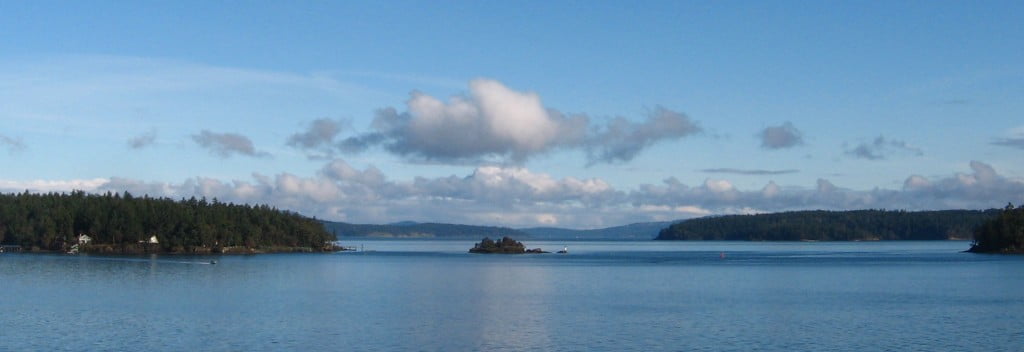Just over a year ago, I composed an audio artwork commissioned by the Deep Wireless Festival of Radio Art. I’m excited to share it as the first audio I’m posting here on my new website.
It’s called Ode to the Salish Sea and it premiered in Toronto on May 30, 2009 in octophonic surround sound at the Wychwood Art Barns, during the Radio Without Boundaries conference. It was broadcast that month across Canada on the venerable and undeservedly discontinued CBC program Outfront, and has since been broadcast on KUOW in Seattle.
At the time of the production of the piece, the Salish Sea was a proposed name for the inland waters that run from Olympia, WA, north to Campbell River, BC. Last November, it became an official name in the USA, to be used on all new maps. I later produced a documentary for CBC’s The Current called The Sound and the Sea, based on Ode to the Salish Sea.
A very long-winded description of the Ode, written during production, follows below.

Ode to the Salish Sea is a composed documentary honouring the body of water that runs from south of Seattle to north of Vancouver and out to the Pacific Ocean, currently known by a number of names depending on where you are (including Puget Sound, the Strait of Georgia and Juan de Fuca Strait).
In the past few years a new name, the Salish Sea, has gained increasingly common usage, used in publications by area residents, marine biologists, First Nations/Native Americans, and even Parks Canada, the Government of Canada’s national park department. This informal use of a name that honours the area’s original inhabitants, the Coast Salish nations, has developed into a movement to officially add the name to the waters (without doing away with their current names).
I gathered materials for the documentary by making field recordings of voices and sounds of the region.
There are three voices heard in two languages (Hul’qumi’num and English): George Harris of the Stz’uminus First Nation, a native Hul’qumi’num speaker and a proponent of the new name; Keith Roy, spokesman for the Monarchist League of Canada, who opposes the name; and Briony Penn, a geographer and environmental activist whose family has lived on Salt Spring Island, BC, since the mid-nineteeth century. The sounds are those of the waters: creeks, waves, boats, ferries and ambient sound, and the sounds of wildlife that depend on the Salish Sea for survival. In addition, I have used a snippet of “God Save the King” to honour the origins of the name Strait of Georgia.
I have layered, twisted, shaped, cut, processed and weaved these recordings into a composed documentary. The end result creates a dream-state balancing the reality of what the Strait of Georgia & Puget Sound sound like today with imagined past and future sounds of the Salish Sea.
Place names are often spoken, and these audible sounds carry with them memory and culture – and thus, great meaning. Native languages are disappearing at an alarming rate as elders die out. In addition, every day, tonnes of earth from Seattle and Vancouver construction pits are dumped into the Salish Sea; every year, the salmon fishery is further threatened. By capturing the sounds carried by the air and waters of the Sea, the Ode seeks to draw attention to the inter-connectedness of the area and its peoples and cultures.
Ode to the Salish Sea was commissioned by CBC Radio’s Outfront and the Deep Wireless Festival of Radio Arts on the theme of Ecology: Water, Air, Sound. The work also benefited from the support of the Canada Council for the Arts, with a travel grant for the premiere in Toronto. The premiere took place May 30, 2009 at the Deep Wireless Festival, Wychwood Barns, Toronto.

This is wonderful. Difficult to try to encompass a vast, rich region in a few minutes of sound, but I found it very evocative…remembering one of the best swims of my life a couple of summers ago, floating in warm waters off Bowen Island.
Thanks very much Jeremy! So glad you enjoyed it.
I could use a swim like the one you describe right about now…